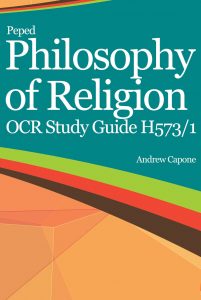Specification H573/1 Plato
January 6, 2018
 Plato is the father of a type of rationalism sometimes called idealism which deduces ultimate reality lies beyond the senses – in what he calls the FORMS. It is understanding, not empirical certainty, that is the goal of true knowledge. His tradition is continued in the work of Immanuel Kant who similarly posits a realm beyond the senses where ultimate reality lies. John Hick (Religious Pluralism section of Christian Thought) sees God as the source of this divine essence – untouchable, unknowable, unprovable but posited as the ultimate reality which makes sense of everything. Key references are hyperlinked (including Julia Annas‘ excellent, if quite challenging introduction to Plato) through the specification below to help you navigate this area. PB
Plato is the father of a type of rationalism sometimes called idealism which deduces ultimate reality lies beyond the senses – in what he calls the FORMS. It is understanding, not empirical certainty, that is the goal of true knowledge. His tradition is continued in the work of Immanuel Kant who similarly posits a realm beyond the senses where ultimate reality lies. John Hick (Religious Pluralism section of Christian Thought) sees God as the source of this divine essence – untouchable, unknowable, unprovable but posited as the ultimate reality which makes sense of everything. Key references are hyperlinked (including Julia Annas‘ excellent, if quite challenging introduction to Plato) through the specification below to help you navigate this area. PB
We have now produced study guides for each paper which build essay-writing (analytical and evaluative skills) step by step, and together with the handouts and marked essays on the website, provide a complete method of mastering this subject. If you need a tutor, please contact me as I have a group of experienced teachers available now. peterbaron@peped.org
1. Philosophical Language and Thought: Plato
Learners will study significant concepts and issues in the philosophy of religion through the works of key thinkers.
1.1. Content
The philosophical views of Plato, in relation to:
• understanding of reality
• the Forms
• the analogy of the cave
1.2 Knowledge
• Plato’s reliance on reason as opposed to the senses
• the nature of the Forms; hierarchy of the Forms
• details of the cave analogy, its purpose and relation to the theory of the Forms
1.3 Issues as the basis of exam questions
Learners should have the opportunity to discuss issues related to the ideas of Plato, including:
• comparison and evaluation of Plato’s Form of the Good
• comparison and evaluation of Plato’s reliance on reason (rationalism)
1.4 Suggested scholarly views, academic approaches and sources of wisdom and authority
For reference, the ideas of Plato listed above can be found in:
• Plato, Republic Book 474c–480; 506b–509c; 509d–511e; 514a–517c
Learners will be given credit for referring to any appropriate scholarly views, academic approaches and sources of wisdom and authority, however the following examples may prove useful:
• Annas, J. (1998) An Introduction to Plato’s Republic, Oxford University Press, Chapters 9 and 10
• Stanford Encyclopedia of Philosophy (2004, rev.2013), Plato, http://plato.stanford.edu/entries/plato/






0 Comments